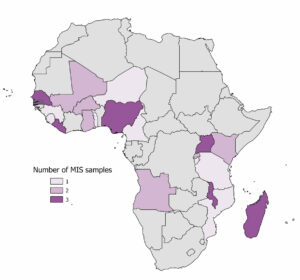By Miriam King, Senior Research Scientist
Malaria is a pressing global health problem, with nearly 250 million malaria cases in 2022, according to the World Health Organization. Approximately 95 percent of malaria deaths were in Africa, with three-quarters of those deaths to children under 5. Climate change is increasing the transmission of mosquito-borne diseases, such as malaria. When IPUMS DHS recently received supplemental funding to support research on Climate Change Effects on Health, adding data on malaria was a top priority. Specifically, IPUMS DHS chose to integrate data from the DHS Malaria Indicator Surveys (MIS).
MIS have been fielded in nearly 30 African countries during the twenty-first century. Developed under an international partnership coordinating efforts to fight malaria, MIS surveys include some standard DHS variables on topics such as demographics, fertility, and household characteristics. MIS questionnaires also include hundreds of questions related to malaria. People’s knowledge about malaria causes, symptoms, and prevention; use of bednets; diagnosis and treatment of malaria, especially for pregnant women and children; exposure to public health messaging; and diagnostic blood testing for malaria in children under 5 are among the topics covered.

IPUMS DHS users now have access to harmonized data from 38 MIS samples, with geographic coverage shown in Figure 1. We prioritized harmonizing responses to MIS questions that matched variables already in the IPUMS DHS database, for approximately 700 widely available variables.
By offering MIS data, IPUMS DHS increases researchers’ ability to study malaria issues—as well as other topics–across time and place. Analysts can select MIS data only; they can also analyze the full range of African data on malaria by including variables from both MIS and standard DHS samples. IPUMS DHS thus breaks through the “siloing” imposed by the different survey type names—standard DHS versus MIS–in public use files from The DHS Program. IPUMS DHS users can conduct robust studies of multiple aspects of malaria across Africa, as well as studying change over time for individual countries.
Harmonization of MIS data was made possible by a 2023 supplemental grant from the Eunice Kennedy Shriver National Institute for Child Health and Human Development.
